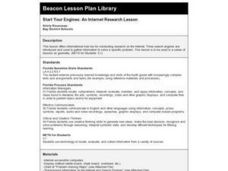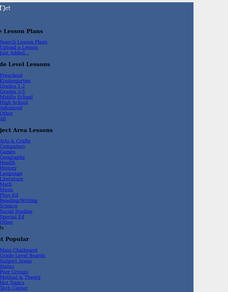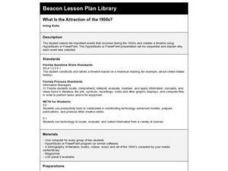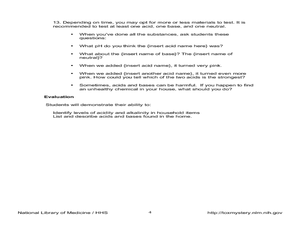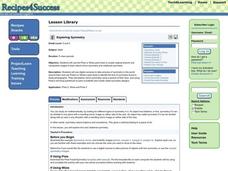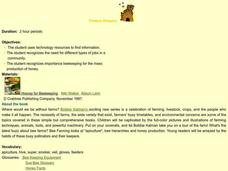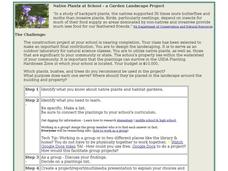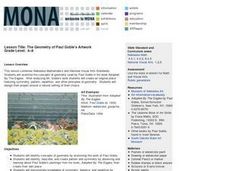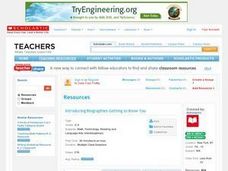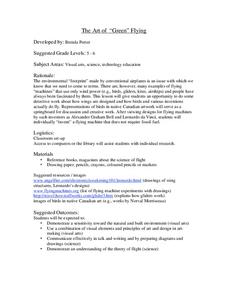Curated OER
Start Your Engines: An Internet Research Lesson
Fifth graders engage in a lesson which offers informational how-tos for conducting research on the Internet. Three search engines are introduced and used to gather information to solve a specific problem.
Curated OER
Regions of the United States
Fifth graders collect data about regions of the United States using the Internet, library books, and encyclopedias. They write an essay persuading people to visit their state.
Curated OER
Travel Agent Presentation
Students participate in a role play as an employee of a country's tourism bureau. They research their country using a variety of resources and create a travel brochure encouraging travel to their country.
National First Ladies' Library
The Education of Abigail Adams
Learners read the biography of Abigail Smith Adams from the First Ladies Library web site. They work in small groups to write a description of her education. Students discuss their findings, and extend this to the education of girls in...
Curated OER
Cooperative Learning, Sci., Tech., Lang
Students research, write, edit, revise and present a paragraph, using word processor, about animal of their choice, including description, where animal lives, what it eats, its habits, e.g. is it endangered, migration, hibernation,...
Curated OER
What Is the Attraction of the 1950s?
Fifth graders, using HyperStudio or PowerPoint, select the ten most important events that happened in the 1950s.
Curated OER
Presidential Trading Cards
Learners research the Internet to collect data about the US Presidents. They use the data that they collect along with available technology to produce trading cards and brochures using keyboarding skills, text boxes, acquiring photos,...
Curated OER
Martin Luther King Jr.: A Clothesline Timeline
Students use print and online resources to obtain information about the life of Martin Luther King Jr. They identify important events in King's life. They sequence lists of important events by date.
Curated OER
Acid or Base? Toxie's on the Case
Students recognize the difference between acids and bases. In this ToxMystery instructional activity, students play a computer game and experiment to find the difference between acids and bases. Students use litmus paper to determine if...
Curated OER
Where are We?
Fifth graders explore places visited by Lewis and Clark. In this geographical concepts lesson plan, 5th graders plot places on a map and put events in chronological order. Students find locations on a map using longitude and latitude....
Curated OER
Writing and Research with a Manatee Theme
Students use Internet research methods to find information about manatees. They write a story about a manatee, told through the manatee's eyes, and also a letter to an environmental group, thanking them for what they do to protect the...
Curated OER
Naked to the Eye
Students understand that microorganisms are too small to see but there are other indications they exist. For this microorganisms lesson, students recognize that some microorganism are helpful and some are not. Students use a microscope...
Curated OER
Exploring Symmetry
Young scholars use a software program to create artwork and to manipulate images to study mirror and rotational symmetry. They take pictures of items in their environment in which they identify symmetry.
Curated OER
The Mystery of Exploration
Students comprehend the history of European exploration of North America. They are introduced to basic reasearch techniques. Students focus on four explorers who visited New York State: Verrazano, Cartier, Champlian, and Hudson. They...
Curated OER
Finders Keepers
Students explore the career of beekeeping. In this careers lesson, students examine the importance of the beekeeping industry. Students read stories about beekeepers and write comparisons. Students write a report on beekeepers and the...
Curated OER
Native Plants at School -- A Garden Landscape Project
In this native plants at school -- a garden landscape project activity, students design the landscape for a school garden by identifying native plants, creating a presentation and creating a plot plan within the budget. This page has...
Curated OER
A is for Area, B is for Billion
Students use important math vocabulary by creating an illustrated storybook. They become familiar with the mathematics terms they encounter on a standardized test and connect these words to the world around them.
Curated OER
The Building Blocks of the Nation
Students research either people how have made history in Michigan, women or people who contributed in specified time periods in American history. They use the Internet to complete the research. They create cube reports using word...
Curated OER
The Geometry of Paul Goble's Artwork
Students examine the concepts of geometry used by Paul Goble in his book Adopted By The Eagles. After analyzing Mr. Goble's work they create an original piece featuring symmetry, pattern, repetition, and other principles of geometry....
Curated OER
THE TRAVELS OF BABAR: An Adventure in Scales
Young scholars locate and identify the seven continents. They use longitude and latitude in establishing a location. Students enhance the knowledge of geographical location with cultures. Individuals or small groups research multiple...
Curated OER
Introducing Biographies-Getting to Know You
Students study biographies as a nonfiction genre while examining a variety of examples. Next, they access and complete an online tutorial about biographies. They choose one person that interests them to conduct further research using a...
Curated OER
A Picture Says a Thousand Words
Students create a writing selection with a well-developed plot. They use a personal photograph in which they are visible to base their autobiographical writing. They write a description of the events surrounding the photograph in the...
Curated OER
Animation Station
Students examine clay animation. In this technology lesson, students use the Internet to investigate the history of clay animation. Students use story boards and clay figures to create their own "animation."
Curated OER
The Art of "Green" Flying
Students create an airship that doesn't use fossil fuel. In this flying lesson, students research different types of flying machines that only use wind power. They discuss invention designs by Alexander Graham Bell and Leonardo Da Vinci...


